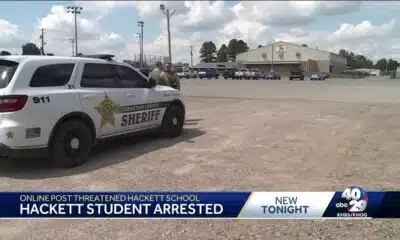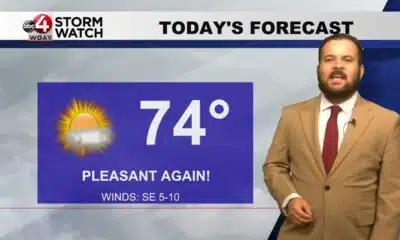News from the South - Georgia News Feed
Trump sends detailed budget request cutting spending by $163 billion to Congress
by Jennifer Shutt, Georgia Recorder
May 31, 2025
WASHINGTON — The Trump administration released significantly more detail about its budget request Friday evening, giving Congress the information it needs for lawmakers to draft the annual government funding bills.
The 1,224-page document sheds light on where exactly President Donald Trump and White House budget director Russ Vought want lawmakers to cut federal spending during the upcoming fiscal year.
The Office of Management and Budget released a “skinny” version of the annual proposal in early May, requesting lawmakers cut domestic spending by $163 billion and keep funding for defense programs flat in the dozen annual appropriations bills.
While the documents in that request provided some insight into how Trump wants to reshape the size and scope of about $1.7 trillion in discretionary funding, which is spending that Congress directs, they didn’t include the level of detail that the Appropriations committees need to begin their work.
The appendix document released Friday should aid in that, though it does not represent a full budget request. That type of proposal would include the White House’s goals for mandatory programs, like Medicare, Medicaid and Social Security, which make up about two-thirds of federal spending. Such spending is required by law and is not subject to annual appropriations.
A full budget request also typically includes tax policy proposals, though with Republicans in Congress already working to enact an extension of the 2017 GOP tax law in the “big, beautiful bill,” those sections would likely be of little use to lawmakers at this point.
Work on spending bills launching
The House Appropriations Committee is scheduled to release and debate its 12 government funding bills throughout June, before voting to send those measures to the floor.
Chairman Tom Cole, R-Okla., will likely include funding levels and policy closely aligned with the White House request, since legislation in that chamber can pass a floor vote with a simple majority
Senate Appropriations Committee Chairwoman Susan Collins, R-Maine, has a more challenging task, since regular bills in that chamber require bipartisanship to get past the 60-vote legislative filibuster. Republicans control the Senate with 53 members.
In general, that means the Senate panel’s bills tend to look much more like the final version that becomes law than the House bills, though not always.
Both chambers are supposed to reach a bipartisan, bicameral agreement on the dozen bills before the start of the next fiscal year on Oct. 1, but that rarely happens.
Congress is much more likely to use a stopgap spending bill until mid-December to give members more time to negotiate funding levels and policies on thousands of government programs.
The House and Senate were unable to reach agreement for this fiscal year, and instead leaned on a series of three continuing resolutions to keep the government up and running.
Partial shutdown could loom again
Tensions over the proposed funding cuts in Trump’s first budget request of his second term could reach a boiling point if Cole, Collins, House ranking member Rosa DeLauro of Connecticut and Senate ranking member Patty Murray cannot broker an agreement before their deadline.
Failure to enact some sort of government funding legislation — either the dozen full-year bills, or a stopgap spending measure — would lead to a partial government shutdown.
Murray, D-Wash., wrote in a statement released Friday evening that it was “telling that President Trump has chosen to release his budget on a Friday night with no fanfare whatsoever.”
“This is a draconian proposal to hurt working people and our economy, and it is dead on arrival in Congress as long as I have anything to say about it,” Murray wrote. “But this is just another reminder we need Republicans to join us to reject these reckless cuts, focus on the investments we actually need to make in our communities and security, and to finally force Trump to follow the law and end his devastating funding freeze.”
DeLauro wrote in a statement that the “government envisioned by President Trump only serves billionaires and the biggest corporations and would do nothing to lower the cost of living.”
“This is not a complete budget,” she wrote. “We are supposed to start putting together the funding bills for 2026 next week. If, as expected, House Republicans follow what President Trump has proposed so far, it is not a serious effort to deliver for the American people.”
Georgia Recorder is part of States Newsroom, a nonprofit news network supported by grants and a coalition of donors as a 501c(3) public charity. Georgia Recorder maintains editorial independence. Contact Editor John McCosh for questions: info@georgiarecorder.com.
The post Trump sends detailed budget request cutting spending by $163 billion to Congress appeared first on georgiarecorder.com
Note: The following A.I. based commentary is not part of the original article, reproduced above, but is offered in the hopes that it will promote greater media literacy and critical thinking, by making any potential bias more visible to the reader –Staff Editor.
Political Bias Rating: Center-Right
This article presents a mostly factual and neutral overview of the Trump administration’s 2026 budget request, focusing on details of the funding proposals and legislative process. While it includes critical statements from Democratic lawmakers opposing the budget, the coverage balances this with factual descriptions of Republican positions and procedural context. The tone does not overtly endorse or condemn the policies but reflects the typical partisan divide on budget issues, leaning slightly toward a Center-Right perspective by presenting the Trump administration’s fiscal priorities prominently and factually, while also giving voice to opposition critiques without adopting their framing fully.
News from the South - Georgia News Feed
Schools navigate challenges in federal clean bus program | FOX 5 News
SUMMARY: The Biden administration’s $5 billion Clean School Bus Rebate Program, launched in 2022 to transition school districts to zero-emission electric buses, faces significant challenges. Mechanical issues and lack of affordable repairs have sidelined hundreds of electric buses, worsened by the financial collapse of major supplier Lion Electric. Lion’s bankruptcy led to maintenance warranty voids, leaving districts like Yarmouth, Maine, and Illinois struggling with non-functional buses. The EPA is monitoring the situation and supporting affected districts. However, other districts, such as Little Rock, Arkansas, using different vendors like Blue Bird, continue to benefit from the clean bus initiative, viewing it as an investment in student health and safety.
The Biden administration launched a program to help schools transition to cleaner buses. While some districts have reported success, others are experiencing difficulties tied to certain suppliers. Federal officials say they are continuing to monitor the situation as schools adjust.
Subscribe to FOX 5 Atlanta!: https://bit.ly/3vpFpcm
Watch FOX 5 Atlanta Live: https://www.fox5atlanta.com/live
FOX 5 Atlanta delivers breaking news, live events, investigations, politics, entertainment, business news and local stories from metro Atlanta, north Georgia and across the nation.
Watch more from FOX 5 Atlanta on YouTube:
FOX 5 News: https://www.youtube.com/playlist?list=PLUgtVJuOxfqkmrF1fONNmi8nKI0Z-FPE-
FOX 5 Atlanta I-Team: https://www.youtube.com/playlist?list=PLUgtVJuOxfqlb_I16wBwizoAoUsfKEeWB
Good Day Atlanta: https://www.youtube.com/playlist?list=PLUgtVJuOxfqlKT5xsbsPFgr5EBzdsWTvG
FOX 5 Extras: https://www.youtube.com/playlist?list=PLUgtVJuOxfqli-5MS_2X-i6bNGWvV0RYP
You Decide: https://www.youtube.com/playlist?list=PLUgtVJuOxfqnCKb7UkRde2NXuaoPEAXut
Download the FOX 5 Atlanta app: https://www.fox5atlanta.com/app
Download the FOX 5 Storm Team app: https://www.fox5atlanta.com/storm
Follow FOX 5 Atlanta on Facebook: https://facebook.com/fox5atlanta
Follow FOX 5 Atlanta on Twitter: https://twitter.com/FOX5Atlanta
Follow FOX 5 Atlanta on Instagram: https://www.instagram.com/fox5atlanta/
Subscribe to the Morning Brief and other newsletters from FOX 5 Atlanta: https://www.fox5atlanta.com/email
News from the South - Georgia News Feed
Aiken neighbors join Labor Day rallies for workers’ rights
SUMMARY: On Labor Day in Aiken, S.C., neighbors joined the nationwide Workers Over Billionaires movement to advocate for workers’ rights and social justice. Among them was Anthony Espinoza, whose husband was detained by ICE, highlighting personal struggles with mental health and financial stability. The diverse crowd united in demanding fairness, criticizing government policies favoring billionaires over vulnerable citizens. Speakers emphasized the need for democratic preservation, equitable tax policies, and support for the working class. Organizers urged civic engagement through protests and contacting representatives. Future rallies, including a statewide event in Columbia, are planned to continue the fight for dignity, fairness, and hope.
Read the full article
The post Aiken neighbors join Labor Day rallies for workers’ rights appeared first on www.wjbf.com
News from the South - Georgia News Feed
Labor Day crowds hit Tybee as beach safety warnings rise
SUMMARY: Over Labor Day weekend on Tybee Island, Georgia, strong winds and waves created hazardous water conditions, prompting lifeguards to warn swimmers about dangerous rip currents. White-capped waves and rough surf led to a red flag warning, with officials considering a double red flag to restrict swimming to knee-deep water for safety. Rip currents cause over 80% of US beach rescues, especially during busy holidays. Lifeguard supervisor Jackson Vrisco emphasized alertness and monitoring conditions, while Mayor Brian West advised those caught in rip currents to stay calm and let the current carry them before swimming back. Visitors should heed flag warnings near lifeguard towers.
The post Labor Day crowds hit Tybee as beach safety warnings rise appeared first on www.wsav.com
-
Mississippi Today3 days ago
DEI, campus culture wars spark early battle between likely GOP rivals for governor in Mississippi
-
Mississippi Today7 days ago
Judge: Felony disenfranchisement a factor in ruling on Mississippi Supreme Court districts
-
News from the South - North Carolina News Feed5 days ago
Parasocial party: Why people are excited for the Taylor Swift, Travis Kelce engagement
-
News from the South - Louisiana News Feed6 days ago
K+20: Katrina alters local health care landscape, though underlying ills still the same
-
Local News7 days ago
Parents of missing 7-month-old California boy are charged with murder
-
Our Mississippi Home6 days ago
The Great Backyard Recovery – Helping Birds After the Storm
-
Local News Video4 days ago
08/29 Ryan's “Wet End to the Week” Friday Forecast
-
News from the South - Florida News Feed6 days ago
Man who shot ex-girlfriend died after shootout with deputies at apartment complex, MDSO says











































